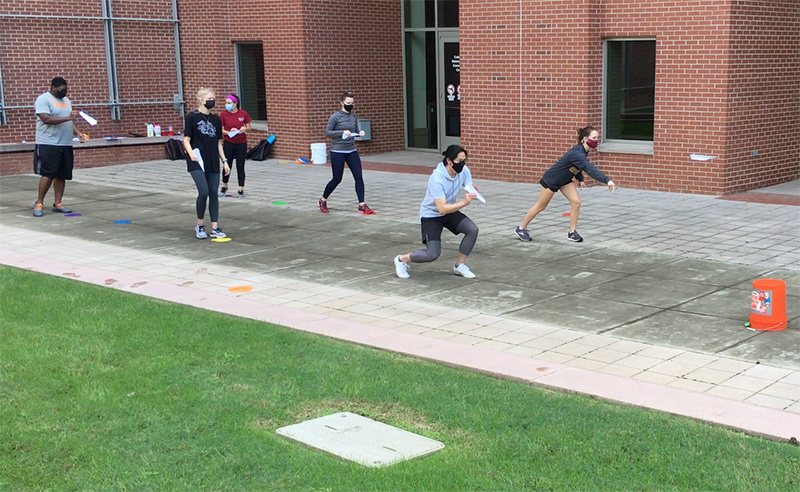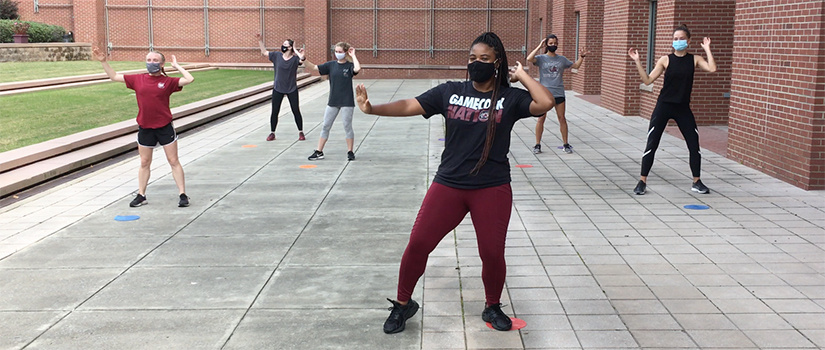Thousands of kids in South Carolina are spending long hours “cooped up” in front of computers as they do schoolwork remotely this fall. That routine worries developmental psychologists like Nicole Kivita Zarrett because it creates habits of isolation and inactivity.
So Zarrett, a University of South Carolina psychology professor, and her team of students and staff have developed new ways to help kids get exercise and socialize, despite social distance.
Zarrett leads the Connect Lab, which uses fun activities to encourage exercise in after-school programs. Her students use dance, yoga, group exercise and games involving teamwork to get kids moving.
“Physical activity is rewarding because it helps meet the social needs of adolescents,” Zarrett says. “It's fun for them because they're connecting with the other kids in the program. They feel a strong sense of belonging.”
They are our next generation of superstars who are going to make a difference in our communities.
— Nicole Kivita Zarrett
The Connect Lab includes students from throughout UofSC ― from psychology to dance, from business to exercise science. In a normal semester, the students visit after-school programs to lead the activities. They partner with program staff to make the activities a permanent part of the routine.
“We’re empowering them to be healthy role models for the kids,” Zarrett says.
“We’re promoting and enhancing mental health and wellness,” says Bailey Wojciak, a public health major who joined the lab earlier this year. The activities are designed “in a way that middle schoolers and elementary students would enjoy."
Blake Ford, an exercise science major in the lab, says middle school is a critical time for health and fitness because as school stops having recess, kids don’t always have an outlet for exercise. “That’s when physical activity starts to decline,” she says. “One of the huge factors is finding things that the kids actually enjoy and want to do in their free time."
Because of the COVID-19 pandemic, the university students couldn’t visit the after-school programs this fall. But the after-school programs needed the Connect Lab’s assistance more than they usually do.
“The program staff were looking for ways they could still engage with the kids and provide them with some fun opportunities to still be active,” Zarrett says.
Luckily, the lab’s intervention manager, psychology alumnus Devin Waldrop, has been editing videos as a hobby for more than 15 years. The lab team used FlipGrid, a video sharing app, to discuss ideas for activities could be presented well in a video.
The group got together ― while maintaining physical distance and wearing face coverings ― to record videos that teach dances, lead participants in simple workouts and share games, such as a paper airplane golf game.

“It's definitely been challenging, but it's been cool to get creative and figure out ways that we can collaborate,” Ford says. “I think it's been really cool to develop all of our online content, to bring what everyone on our team has to offer together in a way that we hope will make an impact.”
Waldrop says the creative process could lead to long-term improvements in the lab program. “Adapting to this increasingly virtual way of life has been a good opportunity for our team to use skills like video production to improve existing lab tools and processes,” he says.
For most activities, the Connect Lab team shared YouTube videos for kids to watch in after-school programs. But they recently had their first live facilitation, where the met with the kids in one after-school program over Google Meets as they learned the Electric Slide line dance. It was fun to add an element of interaction to the program, Wojciak says.
Zarrett admires what the Connect Lab team has done. “They've been amazing, creative and thoughtful. They're all in the videos. They're helping us build content. They've been amazing at bringing these creative approaches to physical activity this year.”
She says the after-school program staff have been very receptive, and the program participants have enjoyed following along. “Their enthusiasm, their engagement, demonstrates to us alone that we've created useful tools to help them continue to connect,” she says.
Waldrop says the lab succeeds thanks to the undergraduate students who are “eager to make a positive difference in South Carolina communities.”
Zarrett agrees. “They are our next generation of superstars who are going to make a difference in our communities.”
